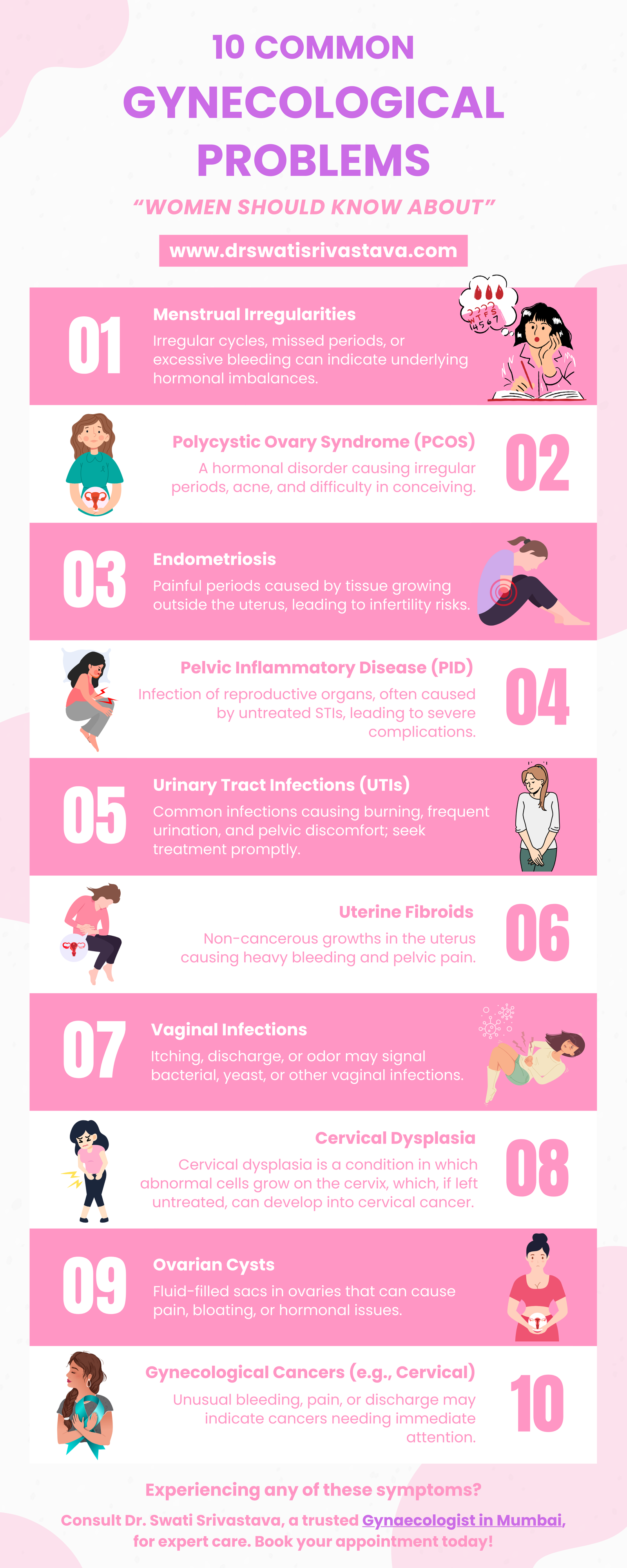Women’s health, especially gynecological health, is often a topic shrouded in silence and stigma in India.
Many women hesitate to talk about issues like irregular periods, infections, or pelvic pain due to societal taboos and a lack of awareness.
However, ignoring these problems can lead to more serious complications that could impact fertility, overall health, and quality of life.
Understanding common gynecological problems is the first step toward taking control of your health.
These issues can affect women at any stage of life—whether you’re a teenager experiencing your first period, a working woman juggling responsibilities, or post-menopausal and navigating the changes of aging.
The good news is that most of these problems are treatable, especially when detected early.
In this article, we’ll explore 10 common gynecological problems, with insights from Dr. Swati Srivastava, an experienced gynecologist in Mumbai dedicated to empowering women with the knowledge they need to take charge of their health.
From menstrual irregularities to infections, this guide will help you identify symptoms, understand potential causes, and learn when to seek medical help.
What Are Gynecological Problems?
Gynecological problems are health issues affecting a woman’s reproductive system, including the uterus, ovaries, vagina, and breasts.
They can occur at any stage of life and often impact overall well-being if not addressed.
In India, factors such as lack of awareness, societal stigma, and delayed healthcare access often prevent women from addressing these issues in time.
Many women dismiss symptoms like pelvic pain or unusual discharge as minor, but they can be signs of underlying conditions that need medical attention.
Early diagnosis and treatment by expert gynecologist are key to managing these issues effectively.
Let’s explore the 10 most common gynecological problems faced by Indian women and how to recognize them.
10 Common Gynecological Problems
Many women experience gynecological issues at some point in their lives, but due to a lack of awareness or hesitation, these problems are often ignored until they become severe.
Here’s a detailed look at the 10 most common gynecological problems, their symptoms, and causes to help you understand when to consult expert gynecologist for professional medical care.
1. Irregular Menstrual Cycles
Periods that do not follow a regular cycle are one of the most common concerns among women.
While occasional irregularities are normal, frequent or extreme changes could indicate an underlying issue.
Symptoms: Cycles shorter than 21 days or longer than 35 days, unusually heavy or light bleeding, skipped periods, or periods lasting more than seven days.
Causes: Hormonal imbalances (e.g., thyroid disorders or PCOS), stress, sudden weight changes, excessive exercise, or conditions like endometriosis.
2. Polycystic Ovary Syndrome (PCOS)
PCOS has become increasingly common, especially among young Indian women.
It is a hormonal disorder that affects the ovaries and can impact fertility if untreated.
Early diagnosis and lifestyle changes can help manage the condition effectively.
Symptoms: Irregular or missed periods, excessive hair growth on the face and body (hirsutism), acne, unexplained weight gain, thinning scalp hair, and dark patches of skin (acanthosis nigricans).
Causes: High levels of male hormones (androgens) disrupt ovulation. Often linked to genetics, insulin resistance, or an unhealthy lifestyle.
3. Endometriosis
Endometriosis occurs when tissue similar to the lining of the uterus grows outside it, such as on the ovaries or fallopian tubes.
This can cause severe pain and even infertility if left untreated.
Symptoms: Painful periods (dysmenorrhea), chronic pelvic pain, pain during intercourse, heavy periods, and difficulty getting pregnant.
Causes: The exact cause is unknown, but potential factors include genetics, immune system disorders, and retrograde menstruation (when menstrual blood flows backward into the pelvis).
4. Pelvic Inflammatory Disease (PID)
PID is an infection of the reproductive organs, often caused by untreated sexually transmitted infections (STIs) or poor menstrual hygiene.
This condition can lead to infertility if not treated early.
Symptoms: Lower abdominal pain, fever, unusual vaginal discharge with a bad odor, pain during urination, and irregular bleeding.
Causes: Bacterial infections, often from STIs like chlamydia or gonorrhea, or infections following childbirth, abortion, or the insertion of an IUD.
5. Urinary Tract Infections (UTIs)
UTIs are extremely common among Indian women, particularly those with poor access to clean washrooms or menstrual hygiene products.
While mild infections are easily treatable, recurrent UTIs can be a sign of underlying problems.
Symptoms: Burning sensation while urinating, frequent need to urinate, cloudy or foul-smelling urine, and lower abdominal pain.
Causes: Bacterial infections (commonly E. coli) due to poor hygiene, holding urine for long periods, or dehydration.
6. Fibroids
Fibroids are non-cancerous growths in the uterus that are common in women of reproductive age.
While many fibroids are harmless, larger ones can cause severe discomfort.
Symptoms: Heavy or prolonged menstrual bleeding, pelvic pain, pressure on the bladder or rectum, and difficulty conceiving.
Causes: The exact cause is unclear, but fibroids are linked to hormonal imbalances (excess estrogen) and genetic predisposition.
7. Vaginal Infections
Vaginal infections, such as yeast infections or bacterial vaginosis, are caused by an imbalance in the vaginal microbiome.
This is often aggravated by poor menstrual hygiene or using unclean public toilets.
Symptoms: Itching, burning, unusual vaginal discharge (white, yellow, or gray), and a foul smell.
Causes: Yeast overgrowth (Candida), bacterial imbalance, or sexually transmitted infections.
Risk factors include damp undergarments, scented hygiene products, and poor hygiene practices.
8. Cervical Dysplasia
Cervical dysplasia is a condition in which abnormal cells grow on the cervix, which, if left untreated, can develop into cervical cancer.
This condition can only be detected through regular Pap smears.
Symptoms: Often asymptomatic in the early stages, but severe cases may cause irregular bleeding or spotting after intercourse.
Causes: Infection with the human papillomavirus (HPV) is the primary cause.
Risk factors include multiple sexual partners and smoking.
9. Ovarian Cysts
Ovarian cysts are fluid-filled sacs that develop on the ovaries.
While most cysts are harmless and resolve on their own, some can grow large and cause complications.
Symptoms: Pelvic pain, bloating, irregular periods, and pain during intercourse. In severe cases, they may cause nausea and vomiting.
Causes: Hormonal imbalances (often linked to PCOS), pregnancy, or endometriosis.
10. Gynecological Cancers
Gynecological cancers, including cervical, ovarian, and uterine cancers, are some of the most serious health concerns for Indian women.
Cervical cancer, in particular, is one of the most preventable yet prevalent cancers in India.
Symptoms: Persistent pelvic pain, unusual vaginal bleeding or discharge, unexplained weight loss, or bloating.
Causes: Risk factors include HPV infection, family history, obesity, and unhealthy lifestyle habits.
Understanding these problems is crucial for early detection and effective treatment.
In the next section, we’ll discuss the key signs and symptoms to watch for and highlight when it’s essential to consult a gynecologist, ensuring timely care for a healthier life.
When to Consult a Gynecologist
Recognizing the right time to consult a gynecologist can make all the difference in preventing minor issues from turning into serious health concerns.
Many women hesitate to seek help, often dismissing symptoms as normal or insignificant.
However, certain warning signs should never be ignored.
Red Flags to Watch For:
Unusual Bleeding: If you experience heavy bleeding during periods, bleeding between cycles, or post-menopausal bleeding, it’s important to seek medical attention.
Persistent Pelvic Pain: Chronic pain in the lower abdomen or pelvic area that doesn’t improve with time or painkillers could be a sign of underlying issues like endometriosis or fibroids.
Abnormal Vaginal Discharge: Foul-smelling, discolored, or unusually thick discharge accompanied by itching or irritation might indicate an infection that needs treatment.
Painful Intercourse: Experiencing pain during or after sexual activity can point to conditions like vaginal dryness, infections, or even endometriosis.
Changes in Menstrual Patterns: If your periods become irregular, excessively heavy, or stop altogether without an obvious reason, it’s time to consult an expert Gynaecologist doctor.
Lumps or Swelling in the Pelvic or Breast Area: Any unexplained lumps in the reproductive organs or breasts should be evaluated immediately.
Difficulty Conceiving: If you’ve been trying to conceive for over a year without success, a gynecologist can help identify potential fertility issues.
Breaking the Taboo:
In India, societal stigma often prevents women from consulting gynecologists until their symptoms become unbearable.
However, it’s essential to overcome these barriers and prioritize health.
Remember, seeking help is a sign of strength, not weakness. Early diagnosis and treatment can improve outcomes for nearly all gynecological problems.
If you’re looking for the best gynecologist in Mumbai, especially a woman gynecologist who understands your concerns with compassion, consider consulting Dr. Swati Srivastava. With her expertise and patient-centered approach, she is dedicated to helping women take control of their reproductive health.
Taking the step to consult a gynecologist when needed ensures a healthier and happier life.
Conclusion
Gynecological health is a vital aspect of overall well-being, yet it often goes overlooked due to stigma, lack of awareness, or hesitation to seek help.
If you’re experiencing any concerning symptoms or have questions about your reproductive health, don’t ignore them.
Taking proactive steps—such as consulting a gynecologist and prioritizing regular check-ups—can help you maintain long-term health and peace of mind.
Your health is your strength, and addressing concerns early is a step toward living a healthier, more confident life.









